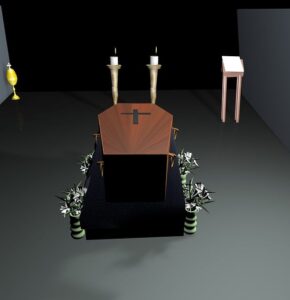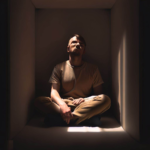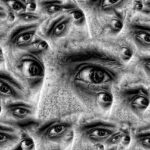Do you find yourself paralyzed at the sight of a dead animal or unable to visit a cemetery without experiencing intense anxiety? If so, you may be one of the many individuals who suffer from necrophobia, or the fear of death and dead things.
This phobia is common among people of all ages and backgrounds and can significantly impact your daily life. Necrophobia can manifest in different ways, such as avoiding anything related to death or dying, obsessive thoughts about mortality, panic attacks triggered by dead animals or corpses, among others.
While it’s natural to feel uneasy about death and dying, living with necrophobia can make it challenging to manage everyday tasks and lead a fulfilling life. The good news is that there are strategies available for managing this phobia that can help reduce its impact on your life.
Understanding Necrophobia: Causes and Symptoms
 It’s important to acknowledge the root causes and physical symptoms of necrophobia in order to begin understanding and addressing its impact on your life.
It’s important to acknowledge the root causes and physical symptoms of necrophobia in order to begin understanding and addressing its impact on your life.
Common misconceptions may lead one to believe that a fear of death or dead things is irrational or uncommon, but it’s actually quite common.
Cultural influences can also play a role in the development of this phobia. Some potential causes of necrophobia include traumatic experiences involving death or dead bodies, genetic predisposition, and cultural attitudes towards death.
The physical symptoms of this phobia can vary from person to person, but may include sweating, shaking, rapid heart rate, and feelings of panic or dread.
While dealing with necrophobia can be challenging, there are strategies for managing fear such as therapy, exposure therapy, breathing techniques and mindfulness exercises.
It’s important to seek professional help if your fear is impacting your daily life. Remember that you’re not alone in your struggle with this phobia and that there are resources available to support you on your journey towards healing.
Identifying Triggers and Managing Panic Attacks
Well, isn’t this just great – we get to talk about identifying triggers and managing panic attacks without even mentioning the very things that trigger our fear of the inevitable. But let’s face it – identifying those triggers is half the battle won.
So, what are some common triggers for necrophobia? Seeing dead animals or people, attending funerals or wakes, watching movies or TV shows with death scenes, or even reading books on death can all be potential triggers.
Once you’ve identified your triggers, it’s time to work on managing those panic attacks. Firstly, remember to breathe deeply and slowly whenever you feel anxious. This simple relaxation technique helps to slow your heart rate and calm your nerves.
Secondly, practice self-care techniques such as taking a warm bath or shower, listening to calming music, or engaging in activities that make you happy.
Lastly but most importantly, seek professional help if necessary. A therapist can help you identify coping mechanisms that work best for you and guide you through exposure therapy – where you gradually expose yourself to your fears in a controlled environment until they no longer hold power over you.
Remember that overcoming necrophobia takes time and effort but as long as you’re willing to put in the work, there’s hope for a future free from irrational fears!
Cognitive Behavioral Therapy Techniques for Coping
By utilizing cognitive behavioral therapy techniques, you can challenge and reframe your negative thoughts and beliefs surrounding death-related triggers. This approach can help reduce your anxiety and improve your ability to handle difficult situations.
One effective technique is called cognitive restructuring, which involves identifying and challenging irrational thoughts that contribute to your fear. During cognitive restructuring, you’ll work with a therapist to identify the thoughts that trigger panic or anxiety when you encounter something related to death. You’ll learn how to examine these thoughts objectively and find evidence that contradicts them. By doing this, you can begin to see things in a more balanced way, reducing the intensity of your fear response.
Another helpful technique is relaxation training. This involves learning relaxation exercises such as deep breathing or progressive muscle relaxation, which can help calm your body’s physiological response to fear. Practicing these techniques regularly can help you feel more in control of your emotions when confronted with death-related triggers, allowing you to cope with them more effectively over time.
Exposure Therapy: Gradual Desensitization
To overcome your fear of death-related triggers, exposure therapy using gradual desensitization can be a helpful technique for you. This type of therapy involves slowly exposing yourself to situations or objects that trigger your fear, starting with less intense scenarios and gradually building up to more challenging ones.
For example, if you are afraid of dead animals, you may start by looking at pictures or watching videos of them before moving on to visiting a natural history museum or observing taxidermy specimens. One way to practice gradual desensitization is through virtual reality simulation. This allows you to experience realistic simulations of potentially triggering situations in a safe and controlled environment.
You can work with a therapist who will tailor the simulation to your specific fears and guide you through the process. Additionally, joining peer support groups for individuals struggling with necrophobia can provide encouragement as well as an opportunity to share experiences and coping strategies.
It’s important to remember that while exposure therapy can be an effective tool for managing fear, it should always be done under the guidance of a trained mental health professional. They can help create a personalized treatment plan and provide support throughout the process.
It’s also important to go at your own pace and not push yourself too far too quickly. With patience and perseverance, gradual desensitization can help alleviate your fear and allow you to live a fuller life without being held back by necrophobia.
Seeking Professional Help: When to Consider Therapy or Medication
If you’re feeling overwhelmed and unable to cope with your fear of death-related triggers, it may be time to seek professional help from a therapist who can provide guidance and support through therapy or medication.
Self care practices and support groups may not always be enough to manage the symptoms of necrophobia. A therapist can help identify the root cause of your fear and work with you on developing coping strategies that are tailored to your individual needs.
Therapy sessions might involve exposure therapy, cognitive behavioral therapy, or other evidence-based treatments that have been shown to be effective in managing anxiety disorders.
Exposure therapy involves gradually exposing yourself to feared situations in a controlled environment while using relaxation techniques to manage any resulting anxiety. Cognitive behavioral therapy focuses on changing negative thought patterns that contribute to anxiety and replacing them with more positive beliefs. These approaches can help reduce symptoms over time and improve quality of life.
Medication can also be an option for those who need additional support in managing their symptoms. Anti-anxiety medications like benzodiazepines or beta blockers might be prescribed by a psychiatrist in combination with talk therapy.
It’s important to discuss the potential risks and benefits of medication with a healthcare provider before making any decisions about treatment options. Remember, seeking professional help is a sign of strength, not weakness, and there’s no shame in asking for assistance when you need it most.
How many people suffer from necrophobia?
Oh, you’re curious about how many people suffer from necrophobia? Well, isn’t that just the million-dollar question.
Despite its reputation as a taboo subject, there has been some research done on the prevalence rates of this fear of death or dead things. It’s estimated that around 0.5-1% of the general population experiences necrophobia at some point in their lives. Interestingly enough, demographic factors such as age and gender don’t seem to have a significant impact on the likelihood of developing this phobia.
So, while it may not be the most common fear out there, it’s certainly not unheard of either.
Is there a genetic predisposition to necrophobia?
It’s important to understand that there may be genetic factors and environmental influences that contribute to a predisposition towards necrophobia.
While it can be difficult to pinpoint exactly why someone may have an intense fear of death or dead things, research suggests that certain genes and life experiences may play a role.
It’s important not to blame yourself for your fears and instead focus on finding ways to manage them in a healthy way.
Seeking support from loved ones or a mental health professional can also be helpful in understanding and coping with any genetic or environmental factors that may contribute to necrophobia.
Can necrophobia be cured?
If you’re suffering from necrophobia, you’re likely wondering if there’s a cure. The truth is that while there is no one-size-fits-all solution for this fear of death or dead things, there are various treatment options available.
These include cognitive-behavioral therapy (CBT), exposure therapy, and medication. CBT aims to change negative thought patterns and behaviors surrounding death through talk therapy sessions with a licensed therapist. Exposure therapy involves gradually exposing oneself to the feared object or situation in a controlled environment until the fear response subsides.
Medications such as antidepressants can also be used to manage anxiety symptoms associated with necrophobia. The effectiveness of these therapies varies from person to person and requires commitment and patience, but they have been successful in helping many people overcome their fear of death or dead things.
Are there any alternative therapies for treating necrophobia?
If you’re looking for alternative ways to treat your necrophobia, hypnotherapy benefits and mindfulness practices are worth considering.
Hypnotherapy, a form of therapy that involves guided relaxation and focused attention to achieve a heightened state of awareness, can help address the root causes of your fear and change your thought patterns.
Mindfulness practices such as meditation and deep breathing exercises can also be effective in reducing anxiety and helping you stay calm in situations that trigger your phobia.
While there’s no one-size-fits-all solution for treating necrophobia, exploring these alternative therapies with a qualified practitioner may offer helpful tools for managing your fear.
How long does it typically take to see improvement with therapy or medication?
Improvement timelines for therapy or medication vary depending on the individual. Some people may see improvement within a few weeks, while others may take several months to experience noticeable changes.
It’s important to remember that therapy and medication are not a one-size-fits-all solution and what works for one person may not work for another. Additionally, it’s essential to understand the difference between therapy and medication in terms of improvement timelines.
Therapy typically involves gradual progress over time as you work through underlying issues with a trained professional, whereas medication can provide more immediate relief from symptoms but does not address the root cause of the fear.
Ultimately, it’s up to you and your healthcare provider to decide which approach is best suited for your needs and goals.
You’ve made it to the end of the article on coping with necrophobia. It takes a lot of courage to confront your fears and seek help, and you should feel proud of yourself for taking this step.
Remember, understanding the causes and symptoms of necrophobia is just the first step in managing your fear. Identifying triggers, using cognitive behavioral therapy techniques, exposure therapy, and seeking professional help are all effective ways to cope with your phobia.
With time and practice, you can learn to manage your fear and regain control over your life. Just know that you’re not alone in this journey. Many others have struggled with similar fears and have found ways to overcome them.
So take comfort in knowing that there is hope for healing and that you deserve to live a happy, fulfilling life free from the constraints of necrophobia.





